- Home
- David Downing
One Man's Flag Page 8
One Man's Flag Read online
Page 8
He transmitted his professional doubts to Cumming, who was predictably unsympathetic, responding to McColl’s insistence that he wasn’t really needed in Calcutta with claims that Tindall had reported the opposite. “This German arms shipment could threaten our whole position in Asia,” his chief wrote from London, as if McColl needed reminding. It seemed he was stuck there until the wretched boat turned up.
And then, a week or so later, new intelligence arrived to bolster his chief’s case. It now seemed that the shipment had left the Americas only a few days earlier and would probably take six weeks or more to reach the Bay of Bengal. Meeting to discuss their next step, McColl and Tindall agreed that six weeks would have seemed a decent stretch of time to find the recipients if they hadn’t already been vainly searching for that many months. But they smiled as they said it—both men felt happier now that they were certain they weren’t chasing shadows, imbued with fresh purpose now that they knew the clock was ticking against them.
With every known enemy under more or less constant surveillance, it was a friend who provided the lead they needed. McColl had met Partha Chaudhuri almost two years earlier, in a showroom on Bombay’s Apollo Street. At that time McColl had still been one of Cumming’s businessmen-spies, seeking out nuggets of intelligence while ostensibly hawking a luxury automobile around the globe. The Indian had admired the car, but not with a straightforward purchase in mind. He was a merchant from Calcutta and interested in starting an agency there for British and American manufacturers.
Their conversation had no commercial consequences, but the two men had enjoyed each other’s company, and Chaudhuri had insisted that McColl look him up if he were ever in Calcutta. Soon after his arrival in January, McColl had followed up on the invitation, partly for the pleasure of seeing the Indian again and partly because he felt an instinctive dislike of the social barrier dividing the British from their often reluctant hosts.
At two subsequent dinners, they had shared their enthusiasm for automobiles and cautiously sounded each other out on the war and its likely consequences. McColl had also been invited to Chaudhuri’s home, an impressive two-story house on the country side of Ballygunge, where he had met the businessman’s wife and two sons. After dinner, sharing a smoke on the moonlit veranda, he and Chaudhuri had felt sufficiently at ease with each other to risk the subject of politics. The Indian, it turned out, was an ardent nationalist but not a fan of Jugantar. A pacifist, he wanted nothing to do with violence or terror. He wanted the English to leave, but with the smiles of people who’d enjoyed their visit and perhaps even learned from their hosts.
Chaudhuri had been smiling himself that evening, yet there was only anxiety in the Indian’s eyes when McColl ran into him crossing the Great Eastern lobby one morning in mid-July. “Can you dine with me tonight?” the Indian asked.
“I’d be happy to. Where—”
“At Peliti’s. I’ll reserve a table for seven o’clock.”
“All right.”
“I must dash now,” the Indian insisted.
As he watched him walk out through the hotel doors, McColl noticed Chaudhuri pause to scan the street before venturing onto the pavement. Something wasn’t right.
That evening Chaudhuri was late, the first time McColl had ever known him be so. And when he did eventually arrive, he looked unusually flustered but declined McColl’s invitation to explain. “Let’s eat first,” he said, looking round at their fellow patrons. “We can talk in the garden.”
Over dinner—a particularly scrawny chicken—they settled for small talk, if discussing a global war could be so described. Both were eager to believe that things were going well but far from convinced by the official optimism that filled the newspapers. The Second Battle of Ypres, which had ended a month or so earlier, had confirmed a rather depressing pattern to engagements on the Western Front, in which one side attacked and gained a few miles and was then forced all the way back again. At the cost, what’s more, of thousands of casualties.
Chaudhuri was pleased that an Indian soldier had been awarded the Victoria Cross after the initial Ypres battle, the first of his countrymen to be so honored, but he was appalled by the German use of poison gas. So was McColl, particularly since his brother had been on the receiving end. Jed had made light of it in his letter, preferring to emphasize the week’s leave granted in consequence, but McColl had heard from other sufferers at second hand and guessed that his brother had been badly frightened. Both sides insisted that the other had been the first to use gas, and McColl’s instinctive reaction was to hope that his side was telling the truth. But really it made no difference. Both would certainly use it now.
There was a constant drip of good news from the Gallipoli Peninsula near Constantinople, where the British had landed earlier that year, but try as they had, neither McColl nor Chaudhuri had found any supportive evidence for this optimism in the occasionally published maps of the fighting. Mesopotamia was the only place where any obvious progress was being made, and Chaudhuri was highly gratified that Indian troops formed the bulk of the army advancing up the Euphrates.
The most interesting event of the early summer, as far as McColl was concerned, was a zeppelin raid on London on the final day of May. The cost in lives had been infinitesimal when compared to the losses sustained on French battlefields, but it seemed to McColl—and Chaudhuri was quick to follow his thinking—that this was the future of war. The zeppelins could carry only a few small bombs and incendiary devices; like airplanes, they were used mainly for reconnaissance. But there was no reason that the latter in particular should not increase in size and carry a commensurate weight of bombs. Sooner or later man’s conquest of the sky would transform the way he fought his wars.
Their discussion of these matters absorbed both men through dinner and might have been further pursued on the garden veranda had the matter on Chaudhuri’s mind not been so pressing. “A young man came to see me yesterday,” the Indian began. “At my office on Clive Street. He was well spoken, well dressed, and I would guess well educated. He told my secretary that his name was Maitra and that a firm in Jamshedpur with whom we do business had sent him to see me. But once he was in my office, he changed his story. He told me he represented an organization of patriots that needed funds for its struggle against the British.”
“Which organization?” McColl asked.
“He was coy about that. ‘One whose name you would instantly recognize,’ he said to me. When I told him I’d only heard of Jugantar, that made him smile, so I presume that’s whom he represents. Anyway, I said he was probably wasting his time with me, that I gave money only to causes I supported and that I was opposed to the use of violence that groups like Jugantar espouse.”
He broke off as the waiter brought their glasses of port. Every other occupant of the long and crowded veranda was white, McColl noticed. Not to mention male. The smell of cigar smoke mingled with the usual outdoor whiff of shit.
“Anyway,” Chaudhuri continued, “this young man smiled again and said that he and his people weren’t asking for money—they were demanding it as their right. If the British could raise taxes to pay for their armies, so could Indian nationalists—if one were more legal than the other, that was only because the British wrote the law. Those Indians who had grown rich enough to buy villas in Ballygunge had a moral duty to support those impoverished by British rule.” Chaudhuri smiled wryly at that, as if recognizing the grain of truth contained within. “And of course he was telling me they knew where I lived.”
“Did he name a sum?” McColl asked.
“Twenty thousand rupees.”
McColl grunted his surprise.
“It is not so much. I could afford it. The money is not the problem.”
“What is?”
“I am torn, as you say. Between my family’s safety and my dislike of these people. I do not want my money to pay for murders.”
“Of
course not. So how did you answer him?”
“I said I would pay but that it would take me a few days to raise the cash. He seemed quite happy with that—I have a feeling I’m not the first rich man they’ve approached. We agreed that he’d come back on Friday.” Chaudhuri took a sip of his tonic water and looked inquiringly at McColl, as if he’d just asked McColl a question.
“It doesn’t sound like you need my advice,” McColl said. “It sounds like you’ve made up your mind.”
“I’ve come to you because I believe you work for the police. If you don’t, then tell me now and we can go back to talking about airplanes.”
McColl was surprised. “What makes you think so?” he asked somewhat stupidly. A simple yes or no would have done much better.
Chaudhuri looked apologetic. “I have told no one,” he said quickly. “But in answer to your question . . . well, when you came to Bombay as a car salesman two years ago, you also met with a friend of mine named Vikram Khare—do you remember?”
“I do.” Khare had been a friend of the Bombay-based Englishman whom Cumming suspected of selling Indian and Ceylonese harbor plans to a local German agent.
“Well, when Vikram and I realized that the Scotsman we both met in Bombay were one and the same man, we knew that you must be working for your government while you traveled with your automobile. A neat arrangement, we both thought, at least in peacetime. When war broke out and you turned up here without a car, I naturally assumed that your other job was taking up all your time. Was I wrong?”
McColl had to laugh. “No,” he admitted. “But if you simply want this man arrested, you’d be better off going to the local police. I can give you—”
“No, you misunderstand,” Chaudhuri interrupted him. “I intend to give these people what they want—I value my family too much to refuse. And I don’t care if I never see the money again. But I would like to help end their campaign of terror. So I’m proposing that you and your people—whoever they are—arrange to follow this man when he leaves my office on Friday, and hopefully he will lead you to his partners in crime. All I ask—all I beg—is that you don’t let yourselves be seen anywhere near the office and that you never let these people know that I had anything to do with their capture.”
“I can promise you that,” McColl said, with all the confidence he could feasibly muster. “Did you agree to a time on Friday?”
“No. He refused to.”
“Not to worry. I can have watchers outside from when you open,” McColl assured the Indian.
Chaudhuri shook his head. “I took a look from my window this afternoon, and anyone hanging around outside will be too obvious. I think it would be better if you waited in our post room downstairs. Once this man leaves my office—which is on the second floor—I can tell you on the speaking tube that he’s on his way out.”
“That sounds like it would work,” McColl agreed.
“And after that I think I shall take my family away for a while. Just in case. I promised my sons that one day I would take them to see America, and this sounds like a good time to do it.”
By six in the morning on Friday, McColl was ensconced in the Chaudhuri & Sons office post room, feeling the day’s first sweat on his forehead. He had noticed the absence of a fan straightaway on arrival, and his only hope of not drowning in perspiration was an early call from the extortioner. Even the mango tree he could see through the window seemed to be dripping with sweat, but this was of course an illusion—it was still engaged in shedding a night of copious rain.
The post room’s staff had been given the day off, but McColl was not alone. He had considered keeping the business to himself—of late the suspicion had been growing that Jugantar had sources of information inside police headquarters—but following even a well-dressed Indian through Calcutta’s streets was work for more than one, especially if the one was white. So the two brightest sepoys used in the Bhattacharyya surveillance were sitting there with him, both staring placidly into space and not mustering a drop of sweat between them. Their names were Sanjay and Mridul.
The other reasons for McColl’s discomfort were the greasepaint covering his face and lower arms and the turban wound around his head. It wasn’t a disguise that would fool a searching glance, but it was better than nothing, and the dhoti was actually a damn sight cooler than his usual shirt and trousers. Every now and then, he would catch one of the two Indians smiling at him and know exactly how strange he must look.
He tried to fill his mind with something other than impatience. He had had a letter from his mother the previous day, expressing her horror at Jed’s getting gassed. It had been lovely to see him, she said, but he’d been keen to get back, “though heaven knows why.” Jed was still coughing fit to burst and said “the brass could use him to keep the Germans awake at night.”
She also wrote of rent strikes convulsing Glasgow, news that hadn’t made the Indian papers. The strikes were all being run by women, his mother said, “which somehow feels both wrong and right.”
Those last words took McColl back to the first time he and Caitlin had made love. She had seduced him and been, in almost every way, more forward than he’d ever imagined a respectable woman could be, but the wrongness had felt so right.
He moved his chair out of the shifting sunlight’s path. He had thought the pain of losing her would gradually diminish, but the opposite seemed to be happening. He had thought he would think of her less, but lately there was rarely an hour of the day from which she was absent. He sometimes felt that her near-constant presence in his waking mind was all that kept her out of his dreams.
He needed to draw a line under the affair, but how? He could write to her, he supposed—a letter to the Brooklyn address should find her eventually. She’d probably tear up the letter without reading it, but curiosity might give her pause, and she might reply. He felt in desperate need of a kinder good-bye; he couldn’t bear the one he had, the picture of her face that morning, so angry and betrayed, so disappointed in how he’d behaved, in who he was.
What had he expected—a cheery farewell?
The morning dragged by without any sign of the fund-raiser. In the office it grew hotter and hotter, and the air seemed palpably thinner, as if he were climbing a mountain. McColl worried that his makeup was running, but his companions assured him it wasn’t.
When someone did rap on the door, it was only to herald the arrival of lunch—three enamel mugs brimming with chicken curry and a greasy Indian flatbread. McColl was happily spooning curry into his mouth with the right hand when pained looks from his companions reminded him that he was holding his bread with the forbidden left.
Soon after that, the rain descended, a few large drops turning in seconds to sheets of the stuff, removing the tree from view and drumming up a storm on someone’s tin roof. It didn’t last long, abating as swiftly as it had begun, as if one of the local gods had suddenly turned off a heavenly tap. The tree swam blearily back into view through the steam rising up from the ground.
McColl was noting his own nostalgia for freezing drizzle when the door swung open and Chaudhuri’s secretary appeared. “The man is here!” he whispered excitedly before swinging it shut again.
It wouldn’t take their quarry long to pick up his money. As one sepoy slipped out the back door—according to their plan, he would make his way round to the street—McColl opened the inner door by a quarter inch and applied an eye to the crack. He assumed he would hear the man’s feet on the stairs, and only a few seconds later he did. The young Indian came into view, wearing a light-colored suit and a topee and carrying a furled umbrella. What better disguise, McColl thought, than that of an Indian aping his rulers?
He and Mridul hurried down the corridor, and McColl put his eye round the jamb. The young Indian was walking south toward Dalhousie Square on the near side of Clive Street; Sanjay was crossing the crowded street to shadow him from the far pavement
. McColl set Mridul in motion down the near side, then hung slightly back himself, trying to keep his men and Chaudhuri’s visitor in view. The two sepoys seemed bright lads, but if it came to a choice between losing their quarry and risking revealing themselves, they’d been told to opt for the former. This made their job a lot harder, but McColl was determined not to put Chaudhuri at risk.
A middle-aged European with a very red face was walking toward McColl, who remembered too late that a local would make every effort not to get in the white man’s way. A heavy clash of shoulders sent the other man reeling, and as he hurried onward, McColl heard an outraged voice rising shrilly behind him. He cursed himself for not staying in character—there he was worrying about the sepoys giving the game away and he might well have done so himself. For several seconds he half expected the shrilling of a police whistle, which seemed bound to spook their quarry. But none sounded above the usual bedlam—if the insulted party had sought official assistance, he had apparently done so in vain.
Reaching Dalhousie Square, the object of their attentions walked down to the tram stop in front of the post office and climbed aboard a stationary car. The first sepoy followed him on, and so, a few seconds later, did the third. With his makeup unlikely to survive such close scrutiny, McColl decided not to follow suit. After watching the tram squeal round the curve and pass in front of the Bengal Secretariat building, he hailed a passing tonga and told the driver to follow. “Yes, sahib,” the driver said, after only a quick look back.
They moved up Bow Bazaar Street, the tonga recovering lost ground each time the tram stopped. After alighting in the Sealdah station forecourt, their Indian strolled north up the little Municipal Railway line, looking somewhat incongruous in his smart clothes. The young man was almost bouncing along, McColl noticed—he was clearly pleased with himself.
The tracks ran alongside the Upper Circular Road, and the sepoys, now walking together, kept to the shadows of the shops lining the western side. McColl paid off his driver and followed, but as the crowds on the pavement thinned, he reasoned that three pursuers might be one too many and allowed the distance between himself and the others to slowly widen. They were almost out of the city, so there couldn’t be far to go.

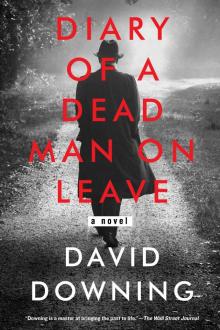 Diary of a Dead Man on Leave
Diary of a Dead Man on Leave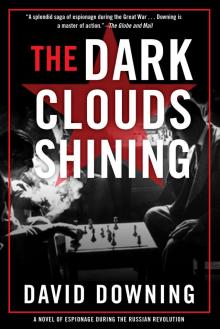 The Dark Clouds Shining
The Dark Clouds Shining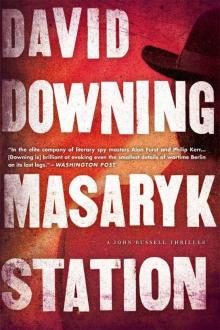 Masaryk Station (John Russell)
Masaryk Station (John Russell)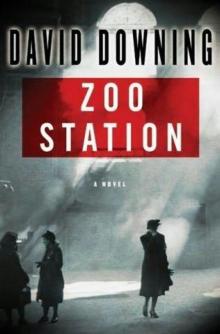 Zoo Stationee
Zoo Stationee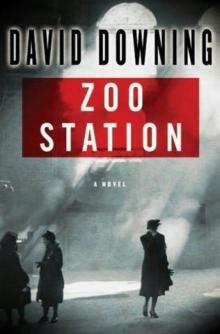 Zoo Station jr-1
Zoo Station jr-1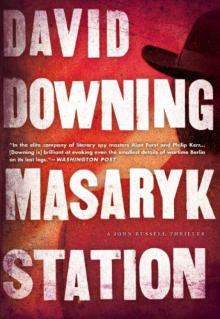 Masaryk Station
Masaryk Station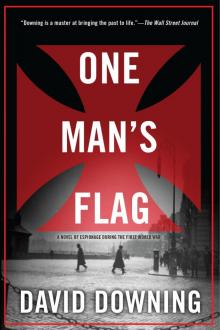 One Man's Flag
One Man's Flag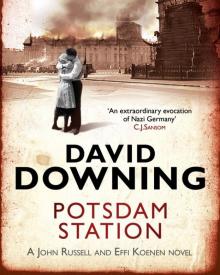 Potsdam Station jr-4
Potsdam Station jr-4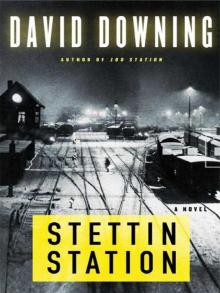 Stattin Station jr-3
Stattin Station jr-3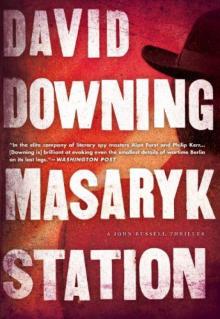 Masaryk Station jr-6
Masaryk Station jr-6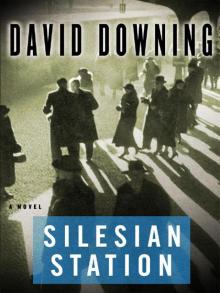 Silesian Station (2008) jr-2
Silesian Station (2008) jr-2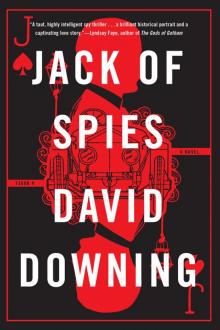 Jack of Spies
Jack of Spies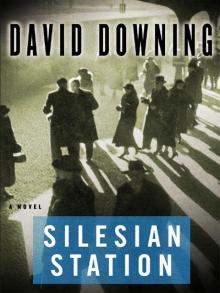 Silesian Station (2008)
Silesian Station (2008) The Moscow Option
The Moscow Option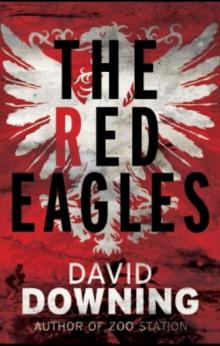 The Red Eagles
The Red Eagles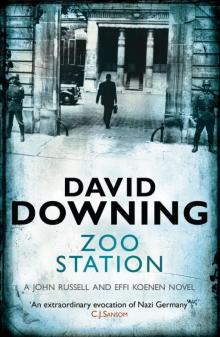 Zoo Station
Zoo Station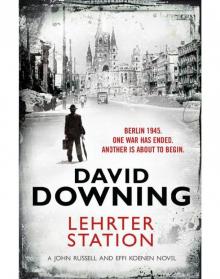 Lehrter Station
Lehrter Station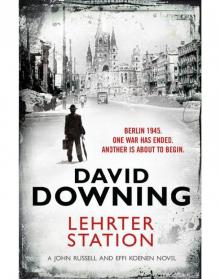 Lehrter Station jr-5
Lehrter Station jr-5